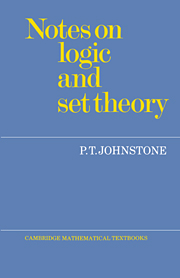9 - Consistency and independence
Published online by Cambridge University Press: 05 June 2012
Summary
Throughout our discussion of ZF set theory, we have been tacitly assuming that it is consistent – or equivalently (if we assume the Completeness Theorem holds in our meta-universe) that it has a model. If so, then we know from the Löwenheim–Skolem theorems that this model will not be unique, even up to isomorphism; but we might still hope that ZF is a complete theory in the sense defined in the proof of Theorem 3.7, i.e. that every sentence in the language of ZF is either provable or refutable from the axioms. (Again assuming the Completeness Theorem, this is equivalent to saying that any two models of ZF are elementarily equivalent, i.e. that they satisfy exactly the same sentences.)
It was thus a natural programme, once the axioms of ZF set theory had been established, to seek to prove that it was both consistent and complete (or alternatively, if it turned out not to be complete, to seek extra axioms which would make it into a complete theory). This programme was first explicitly proposed by D. Hilbert, around 1920; but just ten years later K. Gödel showed that it could not be carried out, by proving his two Incompleteness Theorems. These assert, respectively, that if set theory is consistent then it is incomplete, and that if set theory is consistent then no proof of its consistency can be formalized within set theory.
- Type
- Chapter
- Information
- Notes on Logic and Set Theory , pp. 97 - 107Publisher: Cambridge University PressPrint publication year: 1987



